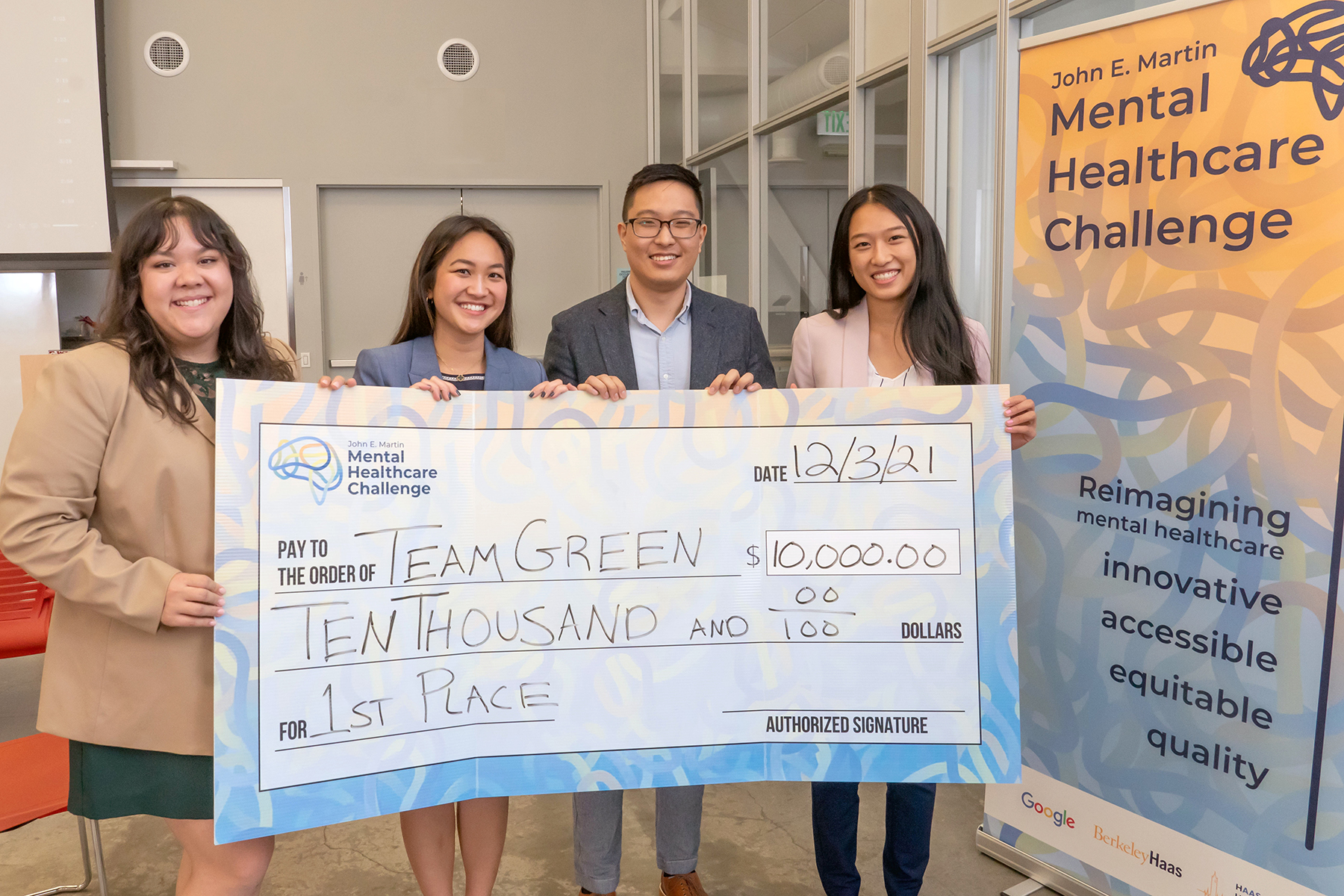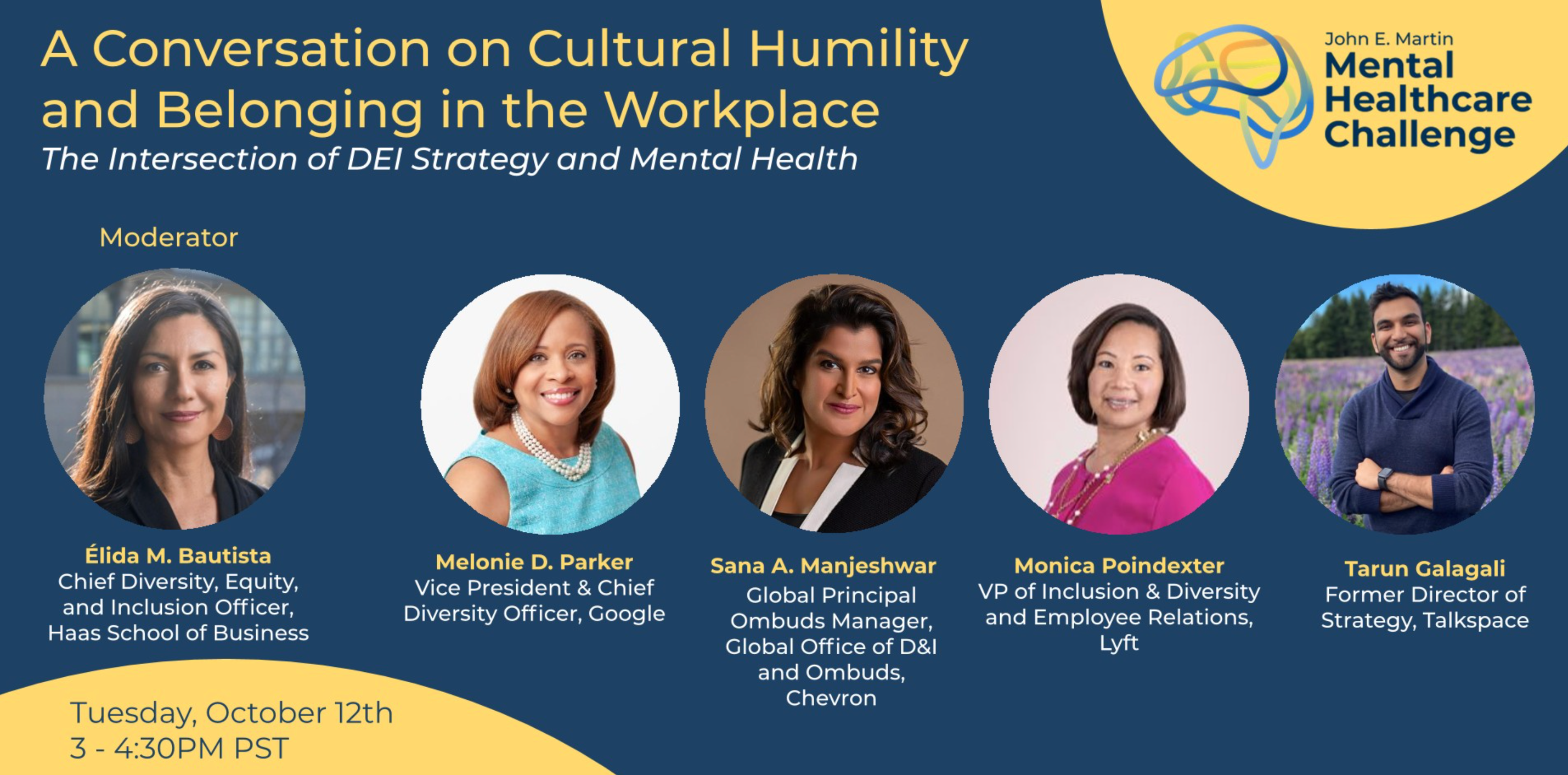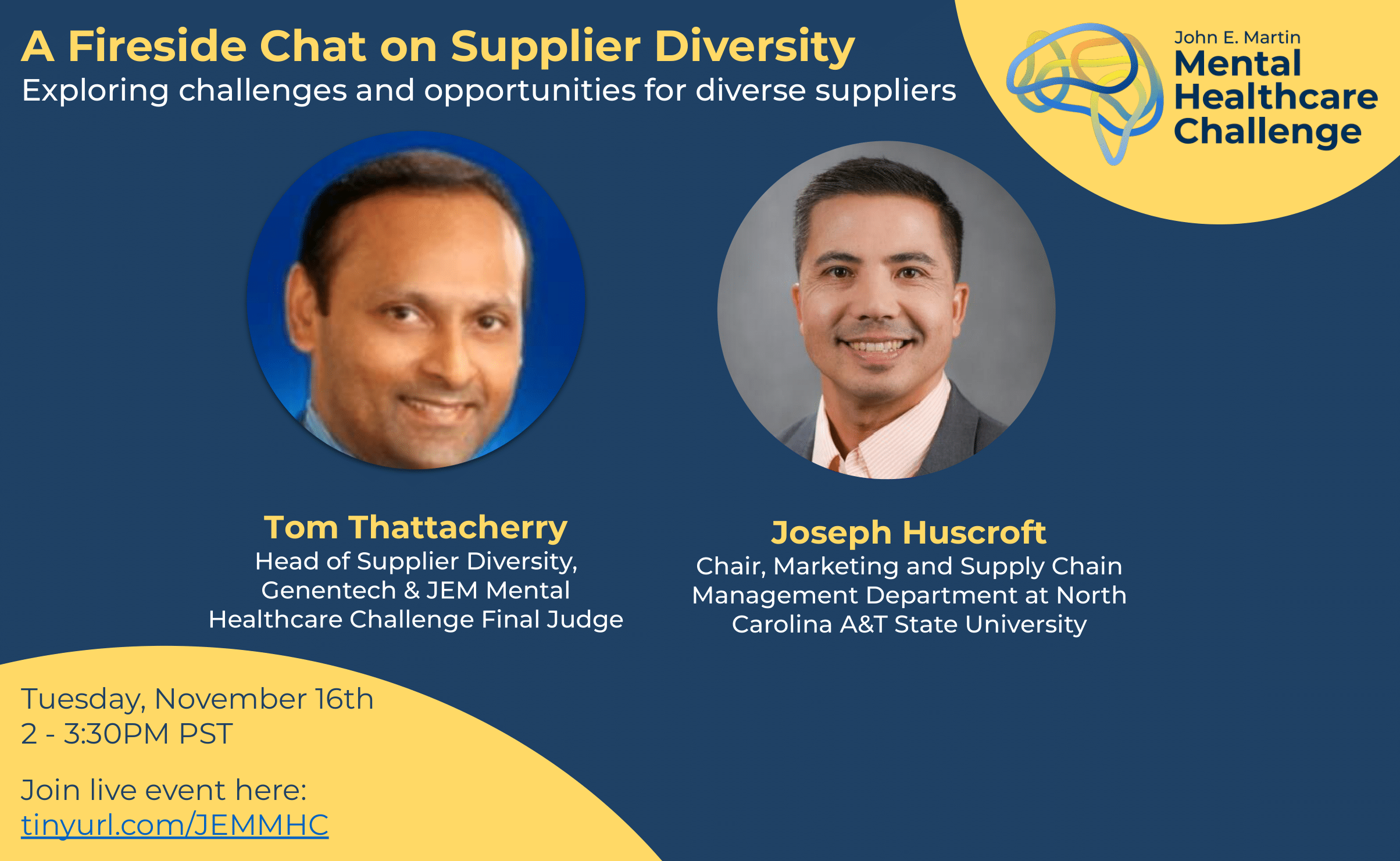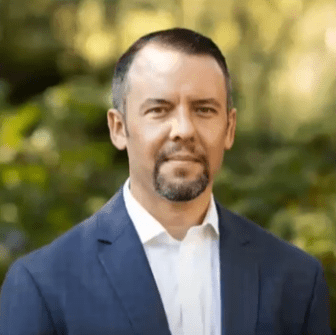
The John E. Martin Mental Healthcare Challenge invites graduate student teams from around the world to explore and develop innovative solutions focused on improving the quality of and access to mental healthcare.
The 2021 mental healthcare challenge tasked graduate students with developing innovative and culturally responsive solutions and strategies to combat mental health issues in the workplace.
“Mental health and diversity, equity and inclusion are top priorities at Haas, and we are concerned by the pandemic’s impact on both… I am thrilled that students are working on innovative solutions to this global crisis.”
– Ann Harrison; Dean, UC-Berkeley Haas School of Business. Press release
The World Health Organization estimates that nearly one billion people worldwide suffer from mental health disorders. Today, with the addition of a global pandemic, rising political polarization, and growing climate uncertainty, we find ourselves in the midst of an escalating mental health crisis that sees, according to the Pew Research Center, 73% of the population experiencing anxiety on a weekly basis. Research further shows that women and people of color shoulder a disproportionate share of the stress both inside and outside of the workplace. The need to act is urgent.
“In the context of the COVID-19 pandemic, women and people of color have had a disproportionate impact on their mental health and well-being although there have been increased reports of psychological distress overall. The future of our workforce depends on how effectively employers can support workers through resources and support.”
— Dr. Lela McKnight-Eily, Google Data Centers’ Chief Mental Health Advisor.
Fortunately, there are strong incentives for businesses and large organizations alike to invest in mental health. Improvements in employee mental health correlate to lower turnover, reduced spending on healthcare costs, and increased productivity. It pays to improve the access to and quality of mental healthcare.
Case Competition
 Team Green, winners of the 2021 John E. Martin Mental Healthcare Challenge. Team Green includes (left to right) Jackie Browning, MBA candidate at Duke Fuqua; Kayla Thompson, MD/MBA candidate at Duke University; Michael Gao, Biostatistics Ph.D. student at Duke University; and Iris Yang, Clinical psychology Ph.D. student at Southern Methodist. Photo credits to Jim Block.
Team Green, winners of the 2021 John E. Martin Mental Healthcare Challenge. Team Green includes (left to right) Jackie Browning, MBA candidate at Duke Fuqua; Kayla Thompson, MD/MBA candidate at Duke University; Michael Gao, Biostatistics Ph.D. student at Duke University; and Iris Yang, Clinical psychology Ph.D. student at Southern Methodist. Photo credits to Jim Block.
In 2020’s inaugural challenge, 12 teams from 10 universities presented solutions to create impactful change at the intersection of technology and mental health. The winning team developed an app focused on improving the mental health of construction workers through addressing prevention, assessment, and intervention.
In 2021, after rigorous screening of applications, 15 teams from leading graduate business schools and health programs around the world were invited to participate in the competition that focused on the intersection of business innovation, diversity, equity & inclusion (DEI), and mental health. Each was challenged to develop a business strategy focused on how large organizations can design and implement culturally informed programs and benefits that support the mental health and wellness of all employees. A panel of esteemed judges with broad experience in business innovation and expertise in mental healthcare then selected six teams to advance to the final round to compete for $25,000 in total prize money.
In the final round of the competition, teams are challenged to refine their strategies and focus on improving the mental health and wellness of diverse supplier workforces (businesses that are at least 51% owned and operated by an individual or group that is part of a traditionally underrepresented or underserved group). The strategies are reviewed and prize winners selected by a team of judges representing senior Google leaders and experts in mental health.
Programming
Throughout the challenge, the Haas Healthcare Association student team delivers a robust program of discussion and debate. Critical issues around mental healthcare are explored through engagement with business leaders and mental health experts.
Speaker Events
2021 programming features a podcast series, a business roundtable on the intersection of mental health and DEI strategy, a panel discussion advancing mental health in diverse supplier workplaces, a keynote event with sports agent Leigh Steinberg and a fireside chat with Connie Chen, COO of Lyra Health.
For more information and access to programming content please reference the resources below:
John E. Martin Mental Healthcare Podcast Series:
- Episode 1: Newton Cheng, Director – Global Health & Performance, Google(opens in a new tab)
- Episode 2: Karan Singh, Co-Founder & COO, Ginger(opens in a new tab)
- Episode 3: Lee Jourdan, Former Chief Diversity Officer, Chevron
- Episode 4: Erica Stephens-Lynch, Head of Global Supplier Diversity at Dow
- Episode 5: Anita Tarab, Director – Sustainability, Environment, Health & Safety, Google
Business Roundtable:
A conversation on cultural humility and belonging in the workplace: the intersection of DEI strategy and mental health. Recording(opens in a new tab) from Tuesday, Oct 12, 2021

Fireside Chat:
Addressing mental health in diverse supplier workplaces. Recording from Tuesday, Nov 16, 2021.

Keynote:
A conversation with Leigh Steinberg on his career as a leading sports agent and his journey surviving alcoholism and depression. Thursday, Dec 2, 2021
Fireside Chat:
Connie Chen, COO Lyra Health. Friday, Dec 3, 2021
Pathways and Partnerships Workshop
Google and Haas will welcome representatives from Historically Black Colleges and Universities (HBCU’s) to join case competition participants and esteemed speakers in a dedicated ‘Pathways and Partnerships’ workshop in December 2021. This half-day workshop facilitated discussions around broadening diversity, equity, and inclusion, promoting advocacy, and establishing strategic alliances that improve the quality of and access to mental healthcare across diverse organizations.
SYMPOSIUM:
Building Wide Reaching, Effective, and Sustainable Mental Healthcare Products Requires Diversity, Equity, & Inclusion. Friday, December 3, 2021.
Get Involved
Join the John E. Martin Mental Healthcare Challenge Linkedin Group for competition updates and to become part of a budding community of mental healthcare advocates.
Contact Us
For general inquiries, please email [email protected]
If you would like to learn more about engagement and partnership opportunities, please contact Anna Nicholls, Director of Corporate Partnerships at [email protected]

